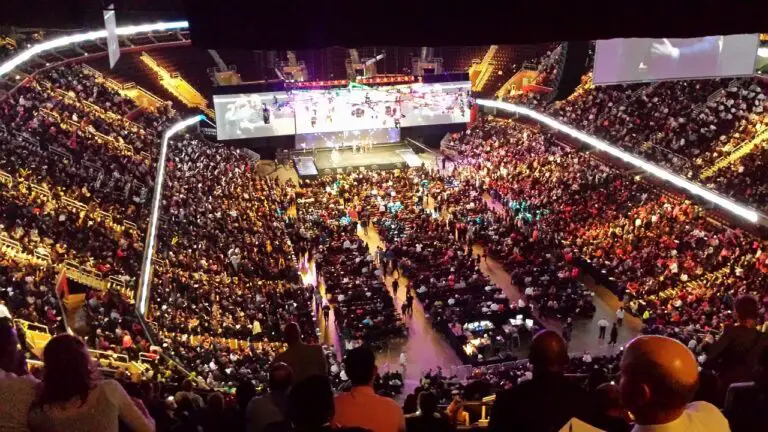How Often Do Bands Go On Tour?
As your band gains a following, things can change faster than expected. While one show a month was enough when your band was new in town, what happens when the shows sell out, and demand for your music rises? This raises an important question: How many concerts do bands play annually?
The short answer is that a touring band will play between 36 and 72 concerts a year, depending on whether they tour once or twice. Smaller, local bands will play more often, some three or more times a week. This would average out to 144 concerts in a year.
With such a nuanced topic, averages aren’t always the most helpful. To make things a little clearer, let’s dive deeper into how many concerts bands play in a year.
What Affects the Number of Shows a Band Plays a Year
The question of how many concerts a band plays in a year has a lot of variables, but the most important of those variables is the band’s popularity.
An up-and-coming local band may play more shows than these popular bands because they are trying to get attention and word-of-mouth buzz going for them. Smaller crews can also play at smaller venues and don’t have as much gear or stage production as bands that do world tours, making it much easier to set up and tear down.
Of course, that same band could have to limit their playing to earn money. Bands just starting typically can’t quit their day job. This takes away from time that could be spent touring.
“…nowadays it’s more about how long they [musicians] can afford to stay on the road vs how long they can afford to stay at home. There are costs and benefits to both, but overall, with gas and travel expenses at an all-time high, you either have to tour light, tour solo, or tour short.”
Arnold, Spells and Curses
If a band tours for fun as a hobby, their schedule will look much more chaotic. Local bands rarely want to pay for extensive travel, so they will keep their shows local (a tour bus is out of budget). This allows them to play whenever, wherever, as long as it’s close enough to their homes to be driven in a reasonable amount of time.
Because of these reasons, it isn’t easy to get a true average of how many shows a band might play in a year. But considering that most bands will go on tour for three months, you’ll get a better idea.
Many bands play multiple shows weekly, with time in between for rest and travel. Bands often do one or two of these three-month tours a year. Bands who tour in this way are the ones that do it for a living.
Below, you’ll find a table that breaks down why the number of plays might change depending on different band situations:
What Reasons Do Bands Play More or Less Than Others?
| Reasons | Details |
|---|---|
| Building a Fanbase (New Bands) | New bands often tour extensively to gain exposure, build a fanbase, and establish a presence. This can mean traveling for several months with small breaks in between to play at various venues, from local bars to opening acts at larger venues. |
| Album Promotion (All Bands) | When an album is released, bands usually tour to promote it. This is a key period to capitalize on the album’s freshness and drive sales of both the music and merchandise. |
| Festival Season (All Bands) | During festival seasons, bands might find themselves on the road more often, playing in multiple festivals across countries or continents. This can heavily influence a band’s touring schedule. |
| Steady Revenue (Established Bands) | For many established bands, touring becomes a primary source of income. Album sales have decreased with the rise of streaming platforms, making live performances a more lucrative option. |
| Contractual Obligations (All Bands) | Sometimes, bands have contractual obligations with record labels or sponsors to fulfill a certain number of performances or tours. |
| Reunion or Farewell Tours (Older Bands) | Bands out of the limelight for a while may reunite for a tour. Bands looking to end their career might embark on a farewell tour. These tours can be extensive, given the nostalgic factor and fan demand. |
| Exploring New Markets (All Bands) | As bands become popular, they may explore touring in new regions or countries where they’ve gained fans but haven’t performed before. This can extend the duration and frequency of tours. |
| Personal Passion (All Bands) | Some musicians and bands love the road and the experience of live performances. This passion can drive them to tour more frequently than others. |
This table provides a glimpse into the diverse reasons bands, be they emerging talents or seasoned artists, decide to hit the road and perform for their fans. The frequency and duration of tours vary depending on many factors, from financial needs to personal desires.
How Often Should My Band Play? [4 Factors That Affect This]
How often your band should play shows depends on what you want out of your band experience. Below are some factors that might affect a musician’s frequency:
1. Money
If you want to make a living from playing shows, you will need to calculate the number of shows you play. Many bands just starting make almost nothing, fuelling their passionate pursuit.
Once you determine whether the cost of travel and the time it takes are worth the money, the venue will pay. With larger bands, many artists can make more money on tour than selling albums.
“No matter what you do, you always have to tour smart, and that just means being as frugal as possible. This means reaching out to your fan-base and asking if you can crash on their floors for a night if you have to. You’d be surprised how far that can extend a tour considering lodging is one of the biggest costs on the road!”
Arnold, Spells and Curses
A band that wants to profit from playing shows might start with 36 shows in a year, doing a three-month tour. You can customize your touring schedule from there to suit your band’s needs.
2. Size
If your band is a smaller local band, aim to play one show every weekend or every other weekend. Since most band members in smaller bands like this often have day jobs, this touring schedule is ideal, since it doesn’t interfere with that.
As you establish a presence, playing less frequently in the same area might be wise, perhaps 1-2 times a month. This ensures that each show feels like an event, drawing a larger crowd.
If you aim to be big, your hometown is your first point. Once you grow beyond your hometown, you can work with promoters and other music industry professionals to explore growth opportunities.
3. Promotion
Musicians living that tour life often need a reason to play. So, if you release more albums, you’ll need to promote it with more live performances.
After you finish making an album of songs, it’s time to let people know about it. Again, a small band will need more performances to spread this knowledge. Considering a larger artist’s career, less promotion is required.
Smaller bands might not tour in these cases. You might end up selling CDs directly to the same small group of people. Meanwhile, a larger performer could hire a tour manager to schedule for them.
4. Burnout
Managing burnout is one of the most important aspects of touring, no matter your end goal. Even some of the highest-paid artists experience burnout while on tour, and more artists than ever are coming forward to say that the current concert industry isn’t sustainable.
It’s easy for people who don’t live “the life” to tell musicians how they don’t work. The music industry’s constant hustle culture isn’t always (or usually) good for your mental health. So, don’t forget about yourself when pursuing your music career. Take a break, you’ve earned it.
So, play shows when you’re comfortable doing so. Try not to push yourself and the rest of your band too hard!
How Many Months Do Bands Tour?
While bands might say that they are embarking on a year-long tour, it’s more than likely that they are doing smaller tour legs over an entire year and not playing shows for all 12 months.
Some of the most common band tour lengths are three and six-month tours. They can play these under the same name as one extensive tour, not two separate ones, but playing longer than three consecutive months can harm an artist’s mental health.
How Long Do Tours Last?
A typical music tour could last anywhere between two to four months, giving the band a chance to ignite stages night after night in different cities, or even countries.
For example, Harry Styles’ “Love On Tour” which spanned from September to November, encapsulating 42 awe-inspiring performances across the United States. The longer the tour, the more the rhythm resonates across the globe, creating a ripple effect of musical euphoria.
However, the journey is not solely measured in days, but in the number of hearts that are ignited by fiery tunes.
Take for instance Elton John’s “Farewell Yellow Brick Road” tour, an epic journey that began in 2018 and ended in 2023. It’s not just a tour, but a magnum opus, a grand narrative of melody that traverses time and space.
So every tour has its own rhythm, its own tempo, and its own tale to tell. And as the tour bus rolls from one city to the next, the beats of the drums meld with the heartbeats of the fans, crafting a symphony that’s as enduring as the road itself.
When Do Artists Release Tour Dates?
Bands rarely go on tour for no reason. Tours usually coincide with new album releases, releases of greatest hit collections, album anniversaries, and in some situations, as a farewell tour when the band (or a member) is ready to call it quits.
Of all these reasons, the most likely explanation for a band to go on tour is that they have an album coming out soon or just released an album. Touring close to the release of an album has some major benefits.
When a band tours around the time they release new music, it allows them to drum up interest and excitement for the new album and give their loyal fans a sneak peek of the new music on said album.
Experts suggest asking yourself a few questions before embarking on a new tour to ensure you can maximize your time on the road. An example of a few questions to ask yourself are:
- Do we have enough songs with enough variety to perform an entire show?
- Is there a concrete reason for going on this tour, and is that reason important enough to bring fans out?
- Can we make the time commitment and roll with any schedule changes that may pop up?
How Much Do Musicians Make Per Concert?
Since cost is a big factor behind why musicians go on tour, they must make money. When starting, bands can make almost nothing, but bands with small followings can make around $500.
Larger bands can make up to $5000 per concert, with some of the largest bands making $10 thousand. This doesn’t account for mainstream bands and musicians like Beyonce, Avenged Sevenfold, The Eagles, and many more you might think of.
The Cost Breakdown of What Smaller Bands Make in a Concert
Let’s assume a ticket’s face value is around $20. So, how much of that $20 goes to the artists and musicians? Here’s a simple breakdown:
- $20 per ticket
- Up to 50% goes to the venue, leaving $10.
- The artist pays about 20% of that to a music agent (leaving $8)
- The music manager takes 20% as well (leaving $6)
- You need to pay an out-of-state tax rate of about 10% (leaving $5)
None of the data above accounts for the extra costs of going on tour. This might include transportation, crew members, meals, and everything else artists needs to pay for while on the road. Many of these costs are tax deductible (thankfully), but you’ll have to consult an accountant to get expert advice on that.
So bands will probably see maybe a dollar or two after everything is said. If you are selling to a venue that seats 500 people, that’s a good chunk of change. Especially when you play three or four shows in a row. Of course, dividing that chunk between four people further decreases the amount..
But this assumes that you’ll be able to sell out the venue every night you are there. Collaborating with your band team gives you a better chance of making this happen. Venues will also provide better cuts to bands who can sell out, as they make money through other means (like selling drinks or food).
Independent artists seem in a better position here, as fewer people are taking a piece of the pie. But, they have to work to drive awareness of their upcoming shows.
In addition, many of these shows don’t just feature one band; they feature many bands. If you aren’t the headliner and are opening for another music group, you’ll likely end up with a smaller piece of the pie, even if the show goes up in value by adding extra talent.
Final Thoughts
Bands can play many concerts throughout the year, but the numbers usually average out to 36 shows on the low end of the spectrum and 144 concerts on the higher end.
The popularity of the band and the reason for touring are the two biggest deciding factors in how many concerts will need to be played during a year.






